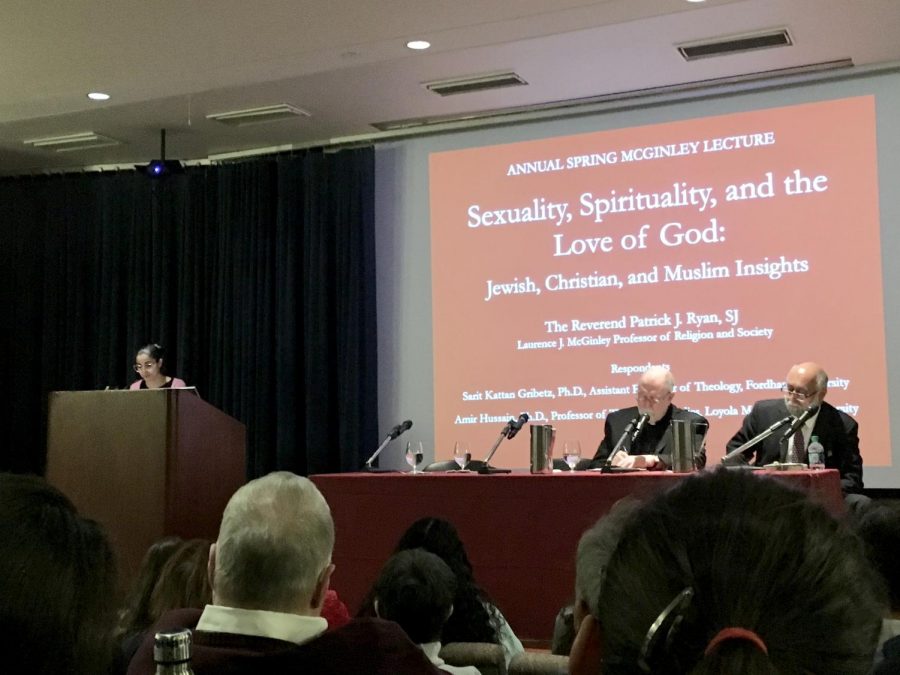Rev. Patrick J. Ryan, S.J, Delivers Lecture on “Sexuality, Spirituality, and the Love of God”
By Patricia Whyte
As cura personalis is care for the entire person, Reverend Patrick J. Ryan, S.J. strives to shed light on some of the complexities of humanity often overlooked by religion.
Ryan gave a lecture Wednesday, April 10 entitled “Sexuality, Spirituality, and Love of God.” The lecture was followed by responses from Sarit Kattan Gribetz, Ph.D., assistant professor of theology at Fordham University and Amir Hussain, Ph.D., professor of theological studies at Loyola Marymount University.
The event was held in the Flom Auditorium in the Walsh Family Library and was open to the public.
Ryan offered insights on understandings of human sexuality and perspectives of God from Jewish, Christian and Muslim perspectives.
“Human beings created in the image and likeness of God, a theme common to the Jewish, Christian and Muslim traditions of faith, have much to learn from God, and especially much to learn from God about how to love,” Ryan said in his lecture.
Father Ryan is the Laurence J. McGinley professor of religion and society at Fordham University. An alumnus himself, Ryan has held numerous positions at Fordham as a Middle Eastern Studies professor, Loyola Chair in the Humanities and Fordham’s Vice President for University Mission and Ministry before his appointment as the McGinley Professor in 2009.
Ryan drew from several scholarly sources during his lecture, mainly focusing on texts from the Bible, the Quran and the Torah, to aid his discussion of gender roles and sexuality as portrayed by these major religions.
“Sexuality is not alien from spirituality but an essential element in it,” Ryan said. The reverend heavily discussed the complexity of humanity and the transcendence of God from modern social structures of gender.
“The love we have for God, or should have for God, and the love God certainly has for us entails loving the fullness of what it is to be human, male and female,” Ryan said.
Following Ryan’s lecture were theology professors Sarit Kattan Gribetz and Amir Hussain, consecutively.
As a Jewish woman, Gribetz’s response to Ryan’s lecture focused primarily on the relationship between God and Israel and examined the link between sexuality and spirituality.
Gribetz discussed biblical texts’ use of metaphor to describe God and Israel as lovers, reflecting that this relationship has the potential to be empowering and also abusive.
Gribetz also examined the major religion’s exclusion of homosexual partnerships as loving relationships.
“We ought not to limit our interpretation of spirituality to heterosexual relationships,” Gribetz said.
Hussain discussed love and good faith, but primarily focused on the exclusion of homosexual relationships from traditional interpretations of spirituality.
“In our current climate, we are in a dangerous place for those who aren’t heterosexual. I think of Islamic psychologists who worry about losing their license if they are anything but heteronormative, and I wonder how we got to that place where we can hate people for the love that God has put between them,” said Hussain.
In his reflection, Hussain wanted to bring light to the presence of love in the Islamic tradition, “especially in a world where so many people do not associate that term with Islam or Muslims.”
Maggie Burzynski, FCRH ’21, attended the lecture to fulfill a requirement for her philosophy class and because she found the content of the lecture to be intriguing.
“I actually liked it way more than I thought I was going to,” Burzynski said. “I thought the lecture part was really informative, and I especially appreciated how they talked about the fluidity of gender when it comes to God, especially in different languages.”
“I feel like a lot of young people are alienated from faith because it’s not relatable, but actually including the whole person and including human sexuality instead of like church, and faith always being a space that excludes that is really important,” Burzynski said.







































































































































































































